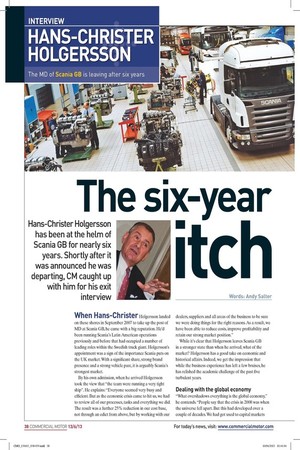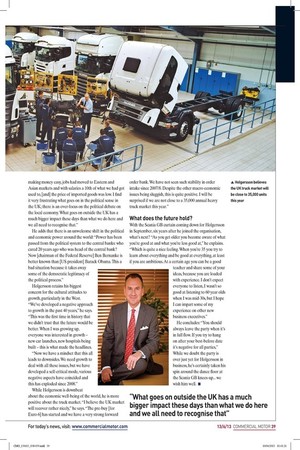The six year Words: Andy Salter Hans-Christer Holgersson has been
Page 29

Page 30

If you've noticed an error in this article please click here to report it so we can fix it.
at the helm of Scania GB for nearly six years. Shortly after it was announced he was departing, CM caught up with him for his exit interview When Hans-Christer liolgersson landed on these shores in September 2007 to take up the post of MD at Scania GB, he came with a big reputation. He'd been running Scania's Latin American operations previously and before that had occupied a number of leading roles within the Swedish truck giant. Holgersson's appointment was a sign of the importance Scania puts on the UK market. With a significant share, strong brand presence and a strong vehicle parc, it is arguably Scania's strongest market.
By his own admission, when he arrived Holgersson took the view that "the team were running a very tight ship". He explains: "Everyone seemed very busy and efficient. But as the economic crisis came to hit us, we had to review all of our processes, tasks and everything we did. The result was a further 25% reduction in our cost base, not through an edict from above, but by working with our dealers, suppliers and all areas of the business to be sure we were doing things for the right reasons. As a result, we have been able to reduce costs, improve profitability and retain our strong market position."
While it's clear that Holgersson leaves Scania GB in a stronger state than when he arrived, what of the market? Holgersson has a good take on economic and historical affairs. Indeed, we get the impression that while the business experience has left a few bruises, he has relished the academic challenge of the past five turbulent years.
Dealing with the global economy "What overshadows everything is the global economy," he contends. "People say that the crisis in 2008 was when the universe fell apart. But this had developed over a couple of decades. We had got used to capital markets making money easy, jobs had moved to Eastern and Asian markets and with salaries a 10th of what we had got used to, [and] the price of imported goods was low. I find it very frustrating what goes on in the political sense in the UK; there is an over-focus on the political debate on the local economy. What goes on outside the UK has a much bigger impact these days than what we do here and we all need to recognise that."
He adds that there is an unwelcome shift in the political and economic power around the world: "Power has been passed from the political system to the central banks: who cared 20 years ago who was head of the central bank? Now [chairman of the Federal Reserve] Ben Bernanke is better known than [US president] Barack Obama. This a bad situation because it takes away some of the democratic legitimacy of the political process."
Holgersson retains his biggest concern for the cultural attitudes to growth, particularly in the West. "We've developed a negative approach to growth in the past 40 years," he says. "This was the first time in history that we didn't trust that the future would be better. When I was growing up, everyone was interested in growth — new car launches, new hospitals being built — this is what made the headlines.
"Now we have a mindset that this all leads to downsides. We need growth to deal with all these issues, but we have developed a self-critical mode, various negative aspects have coincided and this has exploded since 2008."
While Holgersson is downbeat about the economic well-being of the world, he is more positive about the truck market. "I believe the UK market will recover rather nicely," he says. "The pre-buy [for Euro-61 has started and we have a very strong forward order bank. We have not seen such stability in order intake since 2007/8. Despite the other macro-economic issues being sluggish, this is quite positive. Twill be surprised if we are not close to a 35,000 annual heavy truck market this year."
What does the future hold?
He concludes: "You should always leave the party when it's in full flow. If you try to hang on after your best-before date it's negative for all parties," While we doubt the party is over just yet for Holgersson in business, he's certainly taken his spin around the dance floor at the Scania GB knees-up... we wish him well. •







































